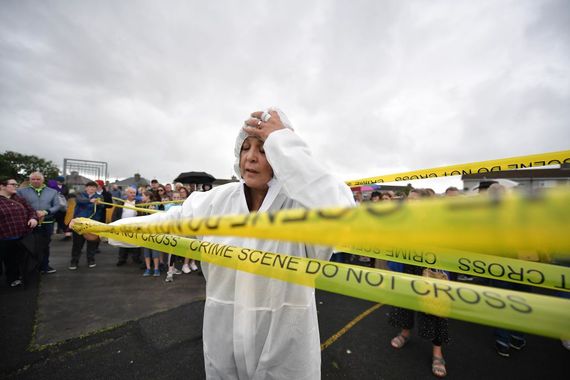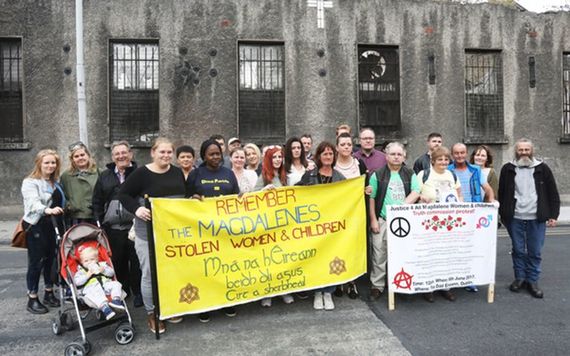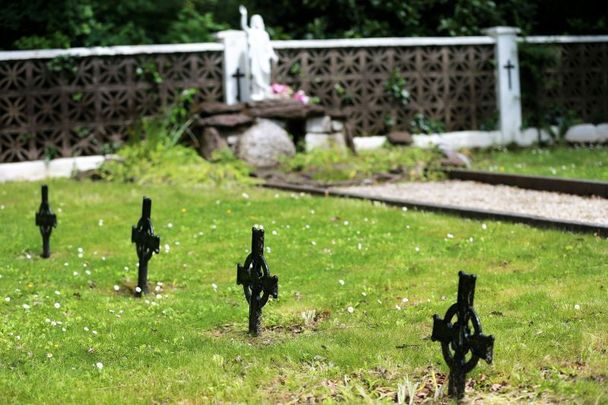Oppressive societies prefer to protect their idea of themselves, rather than their citizens.
Anyone who grew up in Ireland in the last century already knows this. That now fading version of Ireland once enacted draconian laws that idealized us as a place apart, a place of great virtue in a permissive world, despite who the laws hurt or what the social cost would be.
What I later learned is that women's bodies would be their battleground of choice. Whether the issue was divorce, contraception, mother and baby homes, or abortion, it was mostly women in the crosshairs, and in particular, it was their right to determine their own destiny free of coercion.
Who controls the woman controls the future, it turns out. They make up half the population of any given nation, and where they are dependent on the laws and prevailing attitudes of the state, they soon find themselves dependent on the majority male gatekeepers that write and control them.

August 26, 2018: A woman dressed as a crime scene officer holds a protest as a vigil takes place at the site of the mass grave which contained the remains of 796 named babies from the Bon Secours Mother and Baby home in Tuam, Ireland. (Getty Images)
None of this is a secret, although you would be right to imagine our conservative establishment might wish it was. But it's remarkable how many people will collude in their own oppression, accepting the unacceptable because they can see no other choice.
The girls I grew up alongside in Ireland knew that they were being corralled and constrained by the attitudes and laws of the era that we grew up in. But knowing a thing is not the same as challenging it. They recognized how the laws and social attitudes conspired to constrain them but they couldn't find a way to push back successfully.
Many eventually left Ireland, nursing understandable lifelong resentments at how young women were treated there, resentments that have marked their lives like a tattoo. Others stayed behind and agitated in the best way that they could, making their resistance apparent in how they spoke, voted, and lived.
But official Ireland plays the long game. It rides out the eras of protest and progress by building for the future on the firm foundations of its own past. It has many more assets of course, including the greatest asset of all: time.
Official Ireland is in a holding pattern right now, but occasionally you catch an unforgettable glimpse of its workings in a news story that gives you a snapshot of how Irish society stands.
Recent new reports have concluded that the religious congregations involved in exploitation and abuse (Magdalene Laundries where women worked unpaid, Mother and Baby Homes where their children were taken from them and forcibly adopted, industrial schools where the poor were bullied and brutalized) have sold over 75 Irish properties worth a total of over €90 million since 2016.
Some of this money was used to pay redress for the horrors they visited on generations of Irish women, men, and children, however, four religious congregations have declined to make any payments at all to these institutional redress schemes.
Meanwhile, the long shadow of that abuse and exploitation hasn't gone away. Just ask Terri Harrison, who tried to escape the theocracy Ireland was in the 1970s, only to be turned around like an escaped convict by a religious organization that forced her to return to Ireland to give birth to a child that they then quickly took from her (unmarried mothers were considered a destabilizing force to be dealt with).
Now 67, Harrison has spent her adult life in search of the son that was taken from her. “You would think the pain would get easier,” she recently said. “It actually goes the other way because you realize the extra time is blinking and I’m at the latter end of my life now… I keep feeling that I’m getting further and further away from holding my son again.”

August 25, 2017: Supporters outside Gloucester Street Magdalene Laundry. (RollingNews.ie)
This week, it emerged that a long-promised independent review of the testimony given by mother and baby home survivors has been abandoned by the Irish government. The volt-face was dramatic because, in June 2021, Minister Roderic O’Gorman had announced plans to appoint an international human rights expert to re-examine all the written testimony given to the Mother and Baby Homes Commission, with the promise of reporting back this year.
Instead, however, a spokesperson for O'Gorman said that the Minister no longer plans to carry out the proposal of an independent review. No explanation was given for the decision.
The refusal to hear the statements of the Mother and Baby Home survivors under oath means official Ireland can quietly place an asterisk above the statements they have already made.
The long game. It kicks the ball down the road too, since none of these survivors are getting any younger. And it tells you just who's interests are still being served and protected.




Comments